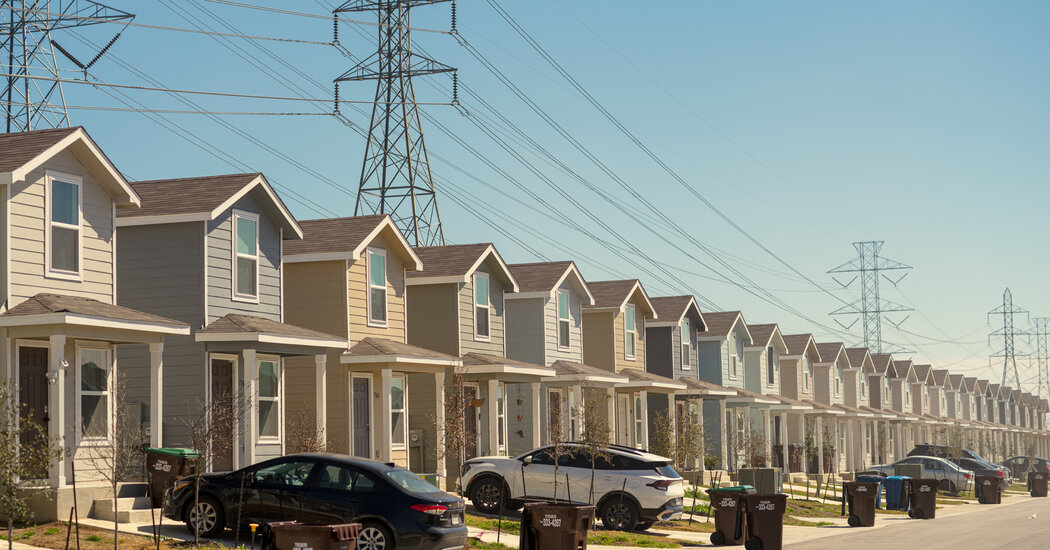President Biden worries about high housing costs. So do Republicans in Congress. The consensus reflects a major problem: Tens of millions of families, across red and blue states, struggle with rent and home prices. The reason is a longstanding housing shortage.
But action in Washington won’t make a huge difference. America’s affordable housing crisis is likely to be solved in cities and states. In today’s newsletter, I’ll explain how many are already doing so in bipartisan fashion.
Local laboratories
Home prices are up about 60 percent over the past decade, adjusted for inflation. About a quarter of renters — some 12 million households — spend more than half their income on housing, far in excess of the one-third level that is considered healthy. Homeless camps have expanded, and “super commuters” — who drive for 90 minutes or longer to work — have migrated well beyond the expensive coasts to smaller cities like Spokane, Wash., and fast-growing metropolitan areas like Dallas and Phoenix.
Generally, Republican-led states have been more affordable than Democratic-led ones. They tend to have fewer construction and environmental rules, which allows the housing supply to expand faster. But as rent and home prices climb beyond middle-income budgets in more places, states are racing to add housing.
The legislation in each state varies. But in general it removes permitting and design barriers so new construction can be approved faster. States are also trying to alter zoning rules to allow a greater diversity of units in more neighborhoods.
One way is to allow more backyard homes — known as granny flats. That way, homeowners can build a space for a renter or family member. Another is to shrink lot sizes so several smaller cottages can be built on parcels currently reserved for only one larger home. Cities and states are also altering zoning rules so duplexes and triplexes can be built in neighborhoods that are currently designated for single-family homes. All these methods aim to increase density within a city’s existing footprint.
Already, Democrats and Republicans in Montana and Arizona have united for housing legislation. A similar coalition has taken shape in other states, including Texas, Minnesota and North Carolina. Even in California and Oregon, whose governments are both dominated by Democrats, Republican votes have helped pass housing bills.
“Some issues become a horseshoe,” said Cody Vasut, a Republican member of the Texas House of Representatives who wants to drastically restrict abortion — but also liberalize land use laws. “We have different views of government, but sometimes we arrive at the same conclusion.”
These coalitions are not always successful. Last week, for instance, the Arizona governor, Katie Hobbs, a Democrat, vetoed a bill that would have allowed smaller homes and lot sizes. She called it “a step too far.”
Most of these laws are too new for us to know their ultimate outcomes. But there’s ample evidence that building more housing reduces prices. In Austin, Texas, for instance, a surge in rent and home prices during the pandemic led to a boom in construction. Now prices are falling, and landlords offer months of free rent to fill empty units.
New coalitions
Why can political parties cooperate on this issue but so little else? Housing politics are hyperlocal and don’t hew to neat ideological lines. Neither party has a hard position that members feel beholden too.
One thing most people agree on is that America has too few homes. According to Freddie Mac, the mortgage finance giant, the nation is short about four million units. The deficit is particularly acute in both low-cost rentals and the entry-level starter homes favored by first-time buyers.
Economists say much of the blame falls on local governments. City councils hold most of the power over where and what types of housing get built, but they are beholden to homeowners who often pack meetings to complain that new developments would destroy nature and snarl traffic.
This is called NIMBYism, short for “Not in my backyard.” The remedy, in both red and blue states, has been to pass laws that strip cities’ power to say no.
State legislatures are close enough to voters to share their concerns about rising housing costs — but far enough that they don’t have to answer for every new local development. They are the Goldilocks level of government for housing reform.
Related: I want to hear from readers about their housing situations. You can submit stories here.
THE LATEST NEWS
Baltimore Bridge Collapse
Holi: The Indian festival is becoming more popular worldwide. Read about the tradition.
Scams: A woman posed as a down-on-her-luck Irish heiress. The man she conned out of thousands started a podcast to track her down.
The Great Read: A legal pot pioneer was busted in Idaho. He has a plan.
Lives Lived: Lee Berry was one of the Panther 21, members of the Black Panther Party who were prosecuted in New York in 1970. His account of abuse in jail was a catalyst for Leonard Bernstein’s Park Avenue fund-raising party that Tom Wolfe satirized in a withering magazine takedown. Berry died at 78.
SPORTS
N.F.L.: League owners approved significant changes to kickoff rules, which will go into effect this season.
College basketball: Iowa and West Virginia drew an average of 4.9 million viewers for their second-round women’s N.C.A.A. tournament game, a pre-Final Four record.
ARTS AND IDEAS
French identity: Aya Nakamura, one of France’s most popular singers, might perform at the opening ceremony of the Paris Olympics. The choice has become a flashpoint in the nation’s culture wars. Nakamura was born in Mali and raised in a Parisian suburb, and her music mixes French lyrics with Arabic and West African dialects.
“In a country often ill at ease with its changing population,” Roger Cohen and Aurelien Breeden write, “she stands on a fault line.”
